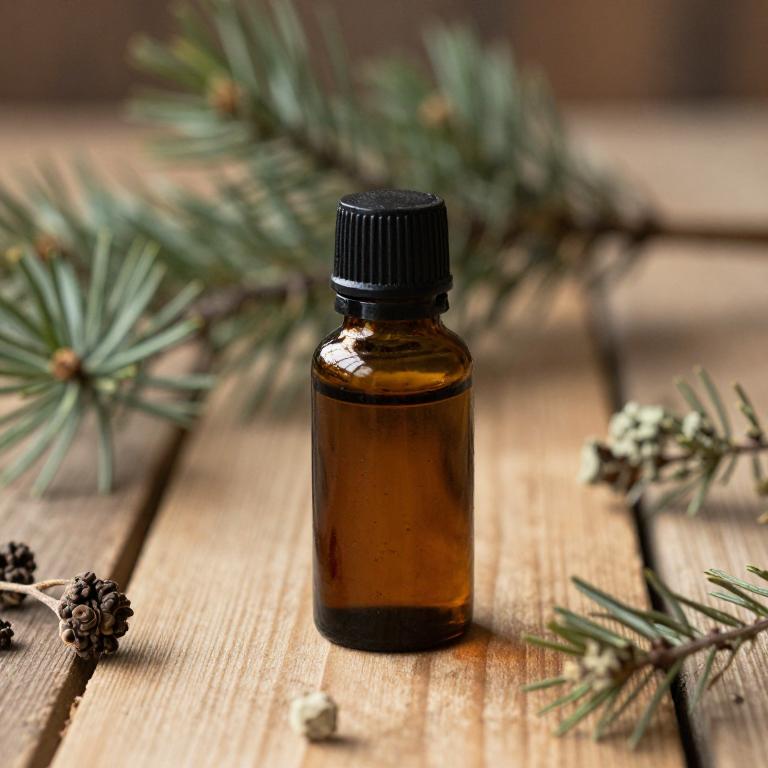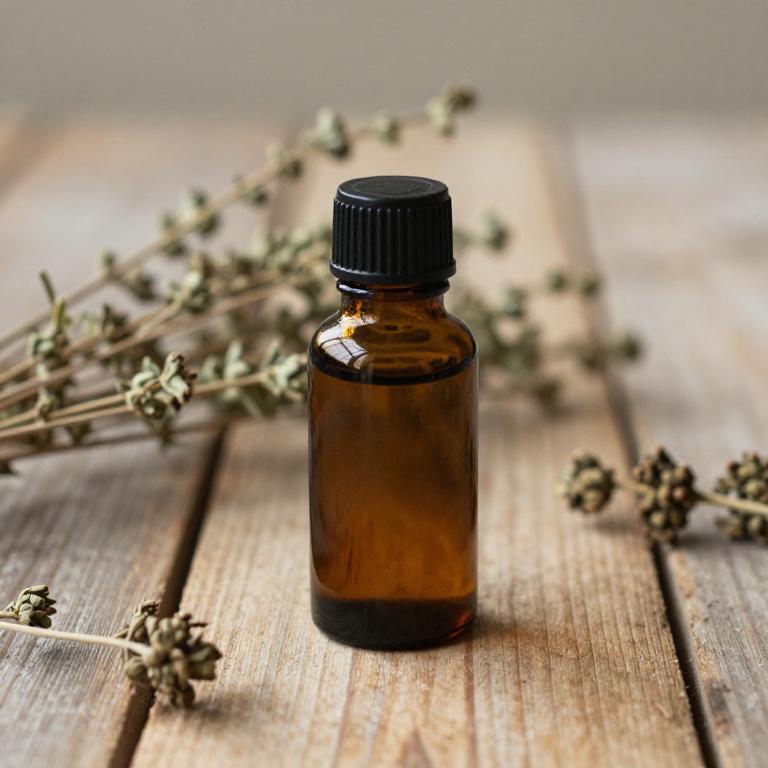10 Best Herbal Essential Oils For Throat Congestion

Herbal essential oils such as eucalyptus, peppermint, and thyme are commonly used to alleviate throat congestion due to their antimicrobial and decongestant properties.
These oils can be diluted with a carrier oil and applied topically to the neck or chest, or used in steam inhalation to help open up the airways and reduce mucus buildup. Peppermint oil, in particular, provides a cooling sensation that can soothe inflamed throat tissues and ease breathing. Eucalyptus oil is known for its ability to reduce inflammation and clear nasal passages, making it effective for respiratory discomfort.
While essential oils can offer natural relief, it is important to use them safely and consult a healthcare professional if symptoms persist or worsen.
Table of Contents
- 1. Eucalyptus (Eucalyptus globulus)
- 2. Thyme (Thymus vulgaris)
- 3. Ginger (Zingiber officinale)
- 4. Scots pine (Pinus sylvestris)
- 5. Rosemary (Rosmarinus officinalis)
- 6. English lavender (Lavandula angustifolia)
- 7. Oregano (Origanum vulgare)
- 8. Melaleuca (Melaleuca alternifolia)
- 9. Peppermint (Mentha piperita)
- 10. Basil (Ocimum basilicum)
1. Eucalyptus (Eucalyptus globulus)

Eucalyptus globulus, commonly known as the Australian eucalyptus, is widely used in herbal medicine for its essential oils, which are particularly effective in alleviating throat congestion.
The essential oil contains active compounds such as eucalyptol and cineole, which have expectorant and anti-inflammatory properties that help to loosen mucus and reduce irritation in the respiratory tract. When used in steam inhalations or diluted in a carrier oil, eucalyptus globulus essential oil can provide relief from coughing and sore throat symptoms. It is often incorporated into natural remedies for colds and respiratory infections due to its aromatic and soothing effects.
However, it should always be used with caution and diluted properly to avoid skin irritation or allergic reactions.
2. Thyme (Thymus vulgaris)

Thymus vulgaris, commonly known as thyme, is a popular herb used in aromatherapy for its potent essential oils that can help alleviate throat congestion.
The essential oil derived from thyme contains compounds like thymol and carvacrol, which have strong antimicrobial and anti-inflammatory properties. When used in steam inhalations or diffused in a room, thyme essential oil can help reduce mucus buildup and soothe irritated throat tissues. It is often blended with other oils such as eucalyptus or peppermint to enhance its decongestant effects.
However, it is important to dilute thyme essential oil properly before use, as it can be quite potent and may cause irritation if applied undiluted.
3. Ginger (Zingiber officinale)

Zingiber officinale, commonly known as ginger, is a popular herbal plant used for its essential oils, which are valued for their therapeutic properties.
The essential oil of ginger contains bioactive compounds such as gingerol and shogaol, which possess anti-inflammatory and antioxidant effects. When used for throat congestion, ginger essential oil can help reduce inflammation and soothe irritation in the respiratory tract. It is often used in aromatherapy or diluted in carrier oils for topical application or inhalation.
However, it is important to consult a healthcare professional before using essential oils, especially for individuals with existing health conditions or allergies.
4. Scots pine (Pinus sylvestris)

Pinus sylvestris, commonly known as Scots pine, produces an essential oil that is valued for its therapeutic properties, particularly in alleviating throat congestion.
The oil contains compounds like alpha-pinene and beta-pinene, which have anti-inflammatory and decongestant effects, helping to reduce swelling and mucus buildup in the respiratory tract. When used in inhalation or diluted in a carrier oil for topical application, it can provide relief from coughing and sore throat symptoms. Its refreshing, woody aroma also has a calming effect, supporting both physical and emotional well-being.
However, it should be used with caution, as it may cause skin irritation in some individuals, and it is recommended to consult a healthcare professional before use, especially for those with chronic respiratory conditions.
5. Rosemary (Rosmarinus officinalis)

Rosmarinus officinalis, commonly known as rosemary, produces an essential oil that is widely used for its therapeutic properties, including its ability to alleviate throat congestion.
The oil contains compounds like cineole and camphor, which have decongestant and anti-inflammatory effects, helping to reduce mucus buildup and soothe irritated tissues in the throat. When used in aromatherapy or diluted for topical application, rosemary essential oil can help open up airways and promote easier breathing. Its stimulating properties also support overall respiratory health, making it a valuable natural remedy for those suffering from colds or seasonal allergies.
However, it is important to use the oil properly, as it can be irritating if not diluted, and should be avoided during pregnancy or by individuals with certain medical conditions.
6. English lavender (Lavandula angustifolia)

Lavandula angustifolia, commonly known as English lavender, is renowned for its calming properties and is often used in aromatherapy.
Its essential oil contains compounds such as linalool and lavandin, which have anti-inflammatory and antimicrobial effects. When used for throat congestion, lavender essential oil can help reduce inflammation and soothe irritation in the respiratory tract. It is typically diluted with a carrier oil and applied topically or used in steam inhalation.
This natural remedy is particularly beneficial for those seeking a gentle, plant-based solution to relieve mild throat discomfort.
7. Oregano (Origanum vulgare)

Origanum vulgare, commonly known as oregano, is a versatile herb whose essential oil has been traditionally used for its potent therapeutic properties.
The essential oil of oregano contains high concentrations of carvacrol and thymol, which possess antimicrobial and anti-inflammatory effects, making it effective in alleviating throat congestion. When used in steam inhalation or diluted in a carrier oil, oregano essential oil can help reduce mucus buildup and soothe irritated throat tissues. Its warming and decongestant properties make it a valuable natural remedy for respiratory discomfort.
However, it is important to use oregano essential oil with caution, as it is highly concentrated and should always be diluted before application.
8. Melaleuca (Melaleuca alternifolia)

Melaleuca alternifolia, commonly known as tea tree oil, is a potent essential oil derived from the leaves of the Melaleuca alternifolia plant, native to Australia.
While it is well-known for its antimicrobial properties, it is also sometimes used in aromatherapy to help alleviate symptoms of throat congestion. When diluted properly, tea tree oil can be applied topically or diffused to help reduce inflammation and soothe irritated throat tissues. Its expectorant properties may assist in loosening mucus and promoting easier breathing.
However, it is important to use it safely, as undiluted tea tree oil can cause skin irritation or allergic reactions.
9. Peppermint (Mentha piperita)

Mentha piperita, commonly known as peppermint, is a popular herb used in the production of essential oils that are often employed for relieving throat congestion.
The essential oil derived from peppermint contains menthol, which has a cooling effect and can help soothe irritated mucous membranes in the throat. When used in inhalation or as a diluted topical application, peppermint essential oil may help reduce the sensation of congestion by promoting clearer breathing. It is often combined with other essential oils such as eucalyptus or thyme to enhance its decongestant properties.
However, it is important to use peppermint essential oil with caution, as it can be irritating to sensitive skin and should always be diluted before use.
10. Basil (Ocimum basilicum)

Ocimum basilicum, commonly known as basil, is a popular herb used in aromatherapy for its therapeutic properties, including its ability to alleviate throat congestion.
The essential oil derived from basil leaves contains compounds like eugenol and linalool, which have anti-inflammatory and antispasmodic effects that can help reduce swelling and irritation in the throat. When used in steam inhalation or diffused in a room, basil essential oil can soothe respiratory discomfort and ease breathing. It is often recommended as a natural remedy for mild cases of sore throat and coughing.
However, it should be diluted with a carrier oil before topical application and used with caution, especially for those with sensitive skin or allergies.